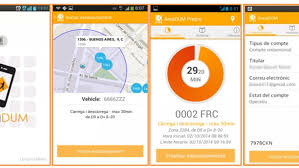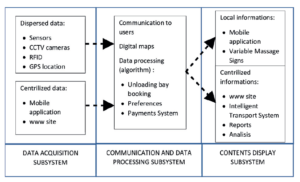Cities are taking measures to ensure that urban freight runs smoothly. These vary from stricter enforcement of illegal parking on loading and unloading zones and better route information for transporters (ITS) to optimization of delivery times windows. E-mobility will receive privileges in certain zones based on intelligent access.
Not every area is the same. By working in a local way, the municipality can deliver the customization that is needed for these zones. The use of new technology is an essential tool for many of these measures. A good example of this is the smart loading and unloading zones where the driver immediately can see whether a loading and unloading zone is occupied or not, and where enforcement gets a signal when a vehicle is parking too long or illegally.
Unloading bays
Unloading bays are one of the measures for improving city logistics. The main strength of this measure is that it effectively reduces congestion due to that loading or unloading operations are realized in a special area and do not influence the traffic flow.
However, one important problem in utilization of unloading bays is their inappropriate use (as a normal parking space, not only for delivery vehicles during the delivering process) and the conflicts between users in the case of few deliveries at the same time and with the utilization of the same unloading bay. The way to solve these problems is the implementation of telematics tools.
Management and enforcement
A new paper by researchers from the Polish Maritime University of Szczecin and the West Pemeranina University of Technology presents examples of utilization of mobile devices and sensors as the support for the unloading bays booking and use. In recent years, along with the development of information and communication technologies, many solutions have been developed to support the operation of urban freight transport, based on the use of transport telematics and intelligent transport systems. A good example is systems supporting unloading bays utilization.
The general principle of operation of telematics systems is the collection, processing, transmission, and analysis of data within three functional subsystems: data acquisition subsystem, data processing and communication subsystem, and content presentation subsystem for users.
This solution is, by its nature, extremely useful and allows to limit the negative impact of freight transport on the urban environment. In addition, it is characterized by a relatively low cost-intensive nature and does not require complicated implementation procedures. However, its effectiveness depends mainly on the way the bays are utilized. They are often used by vehicles as regular parking spaces, which makes them completely lose their usefulness. Telematic systems allowing for supervision over the unloading bays and informing municipal services about their unauthorized utilization seem to be an indispensable element of the system.
Barcelona Spain
The example of Barcelona proves the effectiveness of telematics solutions in relation to the effectiveness of the unloading bays. As a part of the NOVELOG project, the AREADUM unloading bays booking system was developed, based on the use of 9.000 on street unloading area parking spaces for urban freight vehicles. After the pilot period in 2015 the mandatory use of a system for monitoring the use of space in unloading bays was introduced. The system is based on an application for smartphones.

Intelligent access
The implementation of new telematics tools leads to policy questions regarding intelligent access. Based on overall urban freight mobility objectives, how can intelligent access be used for strategic, tactical and operational traffic management, urban planning (use of public space) and enforcement? What cities requirements (data management, technology, organizational/institutional setup, communication) for setting up an intelligent access management system for commercial transport and monitoring and evaluating the use of intelligent access? Research on intelligent access schemes is necessary to develop guidelines as a basis for cities planning to use innovative policy schemes and technology for the improving their urban transport.
Walther Ploos van Amstel

